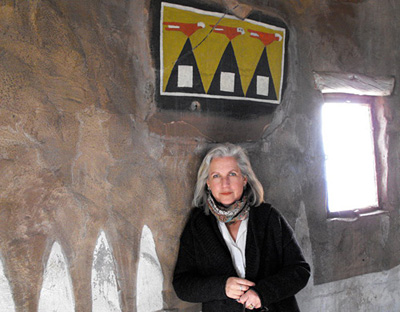
Photo: © Louis Gakumba

911: In Response to Place
by Terry Tempest WilliamsWe were gathered at the Corcoran Museum of Art in Washington, D.C., to participate in the opening of a new exhibit entitled "In Response to Place" sponsored by The Nature Conservancy. Twelve American photographers had been invited to cast their eyes in the direction of wild, open spaces and make art. Among them, Annie Leibovitz took her camera to the Shawangunk Mountains in New York. Mary Ellen Mark traveled north to the remote Pribilof Islands in Alaska. William Christenberry focused on the Bibb County Glades in Alabama. Sally Mann sought light within the Calakmul Biosphere Reserve in Mexico. Terry Evans photographed the Tallgrass Prairie. Karen Halverson made pictures on the Cosumnes River in California. Lynn Davis found an architectural presence within the redrock arches of southern Utah. And Richard Misrach kept his eyes at home, in the Lahontan Valley of Nevada, in the desert where dunes rest as bodies.
It was Tuesday morning. Andy Grundberg and I joined half a dozen of the photographers in a book signing. We were responsible for some of the words. We were scheduled for a mid-morning press conference. The conversation around the table was about the enduring grace of landscape, how this assignment had allowed them to see the world differently.
The conversation shifted to a discussion of death. Sally Mann spoke of her latest project, images that explore how the Earth changes death and how death changes the landscape, even our perceptions of that landscape.
"It will disturb," she said.
"We are so frightened," someone added.
"Why do we turn away from what is inevitable?" another spoke.
"If we can begin to find peace in death, perhaps we can -- "
"Two planes have just crashed into the World Trade Center. Both towers--" a woman from the Corcoran says, entering the room with a cell phone still to her ear.
Conversation stops. The signing of books stops. Bill Christenberry quietly gets up to call his daughter who is attending NYU. Richard Misrach says his son is in the city. Lynn Davis and Mary Ellen Mark both live in Manhattan. I flash to my niece, Libby, a freshman at NYU. We cannot grasp what we have just heard. There is no television to turn on to see or believe with our own eyes.
Minutes later, a security guard enters. "We have to evacuate now, the Pentagon's just been struck-- we have reason to believe the White House is next-- go."
Adrenaline storms my body. The Pentagon? The White House? What is happening? What to do? We all stand, stunned. Sally immediately says anyone who wants to drive home with her to her farm in Virginia is welcome. We gather ourselves. I grab Richard's hand, we run through the empty museum and onto the street. I hear someone quietly say, "Our work is now irrelevant."
Outside, my first instinct is to look up. There is a commercial plane overhead, shining silver. I turn in the direction of the Pentagon. Is that a dark plume of smoke rising? Chaos is growing. People are fleeing from the White House, running across the lawn. Everyone seems to have a hand on their ear, cell phones either calling out or calling in. Employees from the Executive Office Building are exiting in mass on the corner of Seventeenth Street and New York Avenue. Cars are honking. Emerging gridlock.
The next thing I know, I am being shoved into a cab with Richard, Mary
Ellen, Lynn, and Karen, four of us in back, two in front. The cab driver
turns around and asks, "And just where would you folks like to go?"
In the lobby of the Mayflower Hotel, we stand shoulder to shoulder with everybody else who has come in off the streets, maybe a hundred people or more, and watch the television screen. We watch replays of the first plane hitting the tower, then the second. We gasp, we cry, we shake our heads in disbelief and horror. People have their hands over their mouths. No one is speaking. We are watching, with the whole nation and the world, we are watching.
I pull out my notebook from my bag and take notes, a nervous compulsion:
Washington, D.C.
9.11
10:12 a.m.
Terrorist attacks. The twin towers burning. Smoke. The smoke clears. We watch the south tower collapse. Before our own eyes. 102 stories. Thousands of life stories. Gone. Collapsed dreams. Compressed sorrows. Shattered innocence. Blood. They are already saying what they need from us now is blood.
10:29 a.m.
The second tower is now collapsing, a fountain of smoke, steel, and glass, cascading, descending, falling, down, down-- all this in the midst of shimmering, sparkling bits of paper and glass reflecting light, holding the light, even in darkness. Descending darkness. Birds falling? They are people falling. "My God," a man cries. "Mercy," another responds. The woman sitting on the couch is weeping. Cameras shift to the Pentagon. "Oh, Jesus." The young man sitting on the floor next to me is rocking back and forth. "Tom, please be alive, please be alive." He is a security guard at the Pentagon who tells me he had just left to go to a doctor's appointment thirty minutes before the attack. "That's my post. They won't let me back in. I know all the people in those offices. Tommy's my partner-- Please be alive, please be alive." He keeps pressing Redial on his cell phone. "Come on, Tom, answer, answer." He clicks off. "Dammit, I can't get through."
10:40 a.m.
"This is war-- " declares Peter Jennings.
Live coverage from Washington, D.C. We are in Washington, D.C. It's hard to tell whether the sound of sirens is coming from inside the television or from outside on the streets. First words coming out of the Pentagon say there may be eight hundred dead. Nobody knows. Nobody seems to know anything. Here we are in the seat of power, standing in terror, as fear and uncertainty are locked in our bodies. Where is the president? Where is Dick Cheney? Within minutes, Washington, D.C. is transformed into a police state. Black-shrouded snipers are perched on the roof of the White House like ravens.
New York City is burning.
The Pentagon is burning.
They say what they need from us now is blood.
I am back on the street, alone, never have I felt more alone, far from my home in the redrock desert of Utah. I cannot reach home. All phone lines are jammed. In my bag, I remember I have a small piece of sandstone that I brought from home, a talisman from the banks of the Colorado River. I stop in the middle of the sidewalk, find it, and hold it tightly in the palm of my hand like a secret and then continue walking in the steady stream of people, dazed, distracted, and scared.
Chaos is controlled by a strange stoicism living on the streets, everyone is trying to leave, call it escape, cars bumper to bumper, this time no horns are honking. It is an orderly fear. I see faces staring straight ahead. Windows rolled down. Radios on. Some cars are being abandoned, people resolutely walking across the Fourteenth Street Bridge like refugees. Four fighter planes scream overhead, flying low, so low. I can see numbers painted on their bellies, F-16s wheeling right, then left in the direction of the White House. Yellow police tape is wrapped around city blocks like its own terrorist package. I cannot get to my hotel. Flags are already flying at half mast. I just keep walking the streets, watching, listening, observing, no place to go, where can I go?
A Palestinian kneels in the middle of the intersection on I street and
Seventeenth, crying, "I didn't do it, you Americans did it." Traffic is
halted, creating a barrier. A crowd gathers around him. A stone in my hand.
And just where do we go now to believe the myth of our own making, that there
are places on this planet immune from suffering?
Used by permission of the author. May not be reprinted or used without permission of the author and Brandt & Hochman Literary Agents, Inc.
